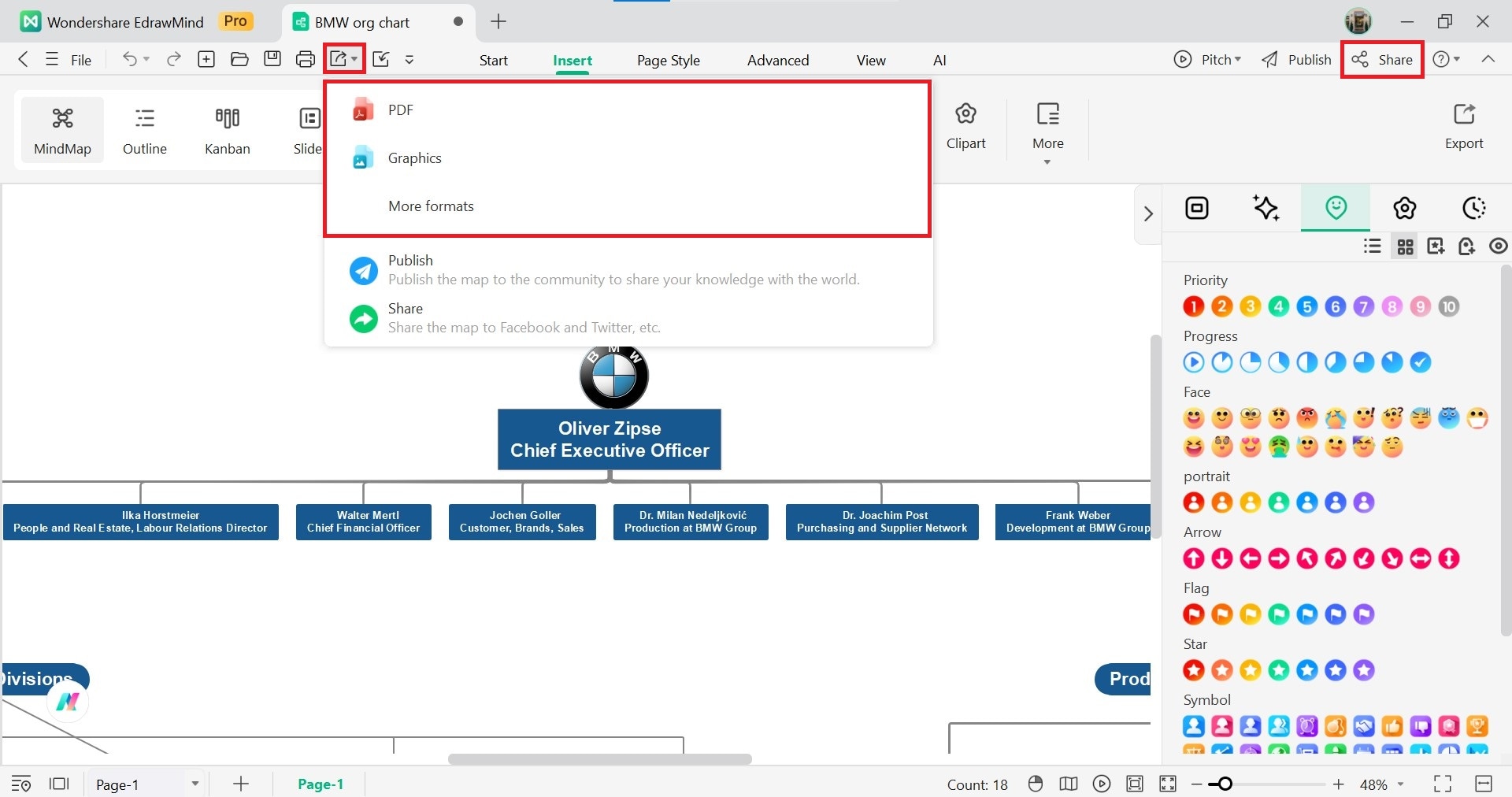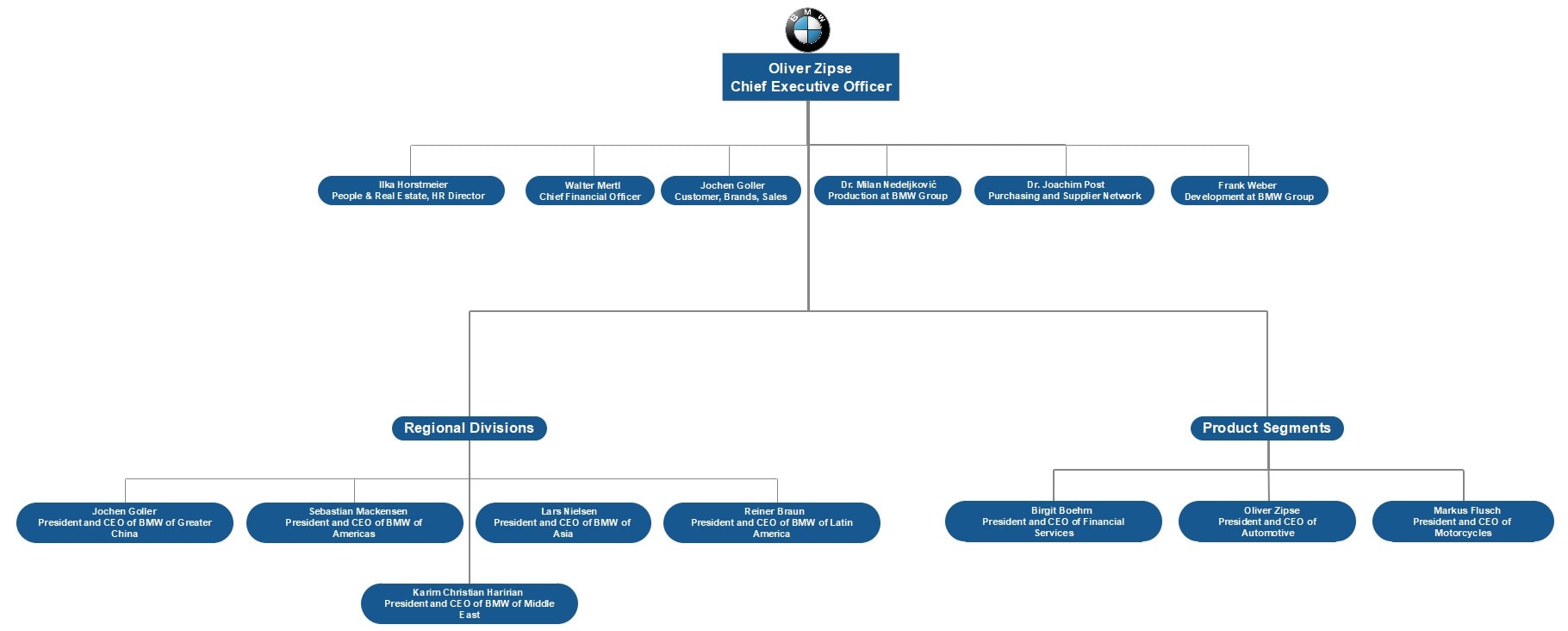BMW’s organizational structure is the backbone of its innovative technology. It was founded in 1916 in Munich, Germany.
Today, BMW is an automotive icon we all know. It operates in 140+ countries with nearly 155,000 employees, a small city in itself. BMW’s organizational division is a matrix-style structure that balances centralized leadership and regional autonomy.
This approach balances centralized leadership with regional autonomy. It allows creative freedom within each division while aligning with the company’s core values and policies.
BMW also has an impressive list of subsidiaries, including MINI, Rolls-Royce, and BMW Motorrad, catering to diverse audiences. Let’s dig more into how they operate it all smoothly.
In this article
BMW’s Organizational Structure
Now that we’ve seen the basics, let's get into the details of BMW’s organizational structure. However, the question is, how can one understand the organizational structure of such a huge firm? Organizational structural charts got you!
Consider organizational structure a chart that helps you better understand and break down the organizational division. It helps you understand roles, responsibilities, and relationships in one go.
As for BMW’s organizational structure, it is divided into three categories:
- Executive leadership
- Regional divisions
- Product segments
To help you understand better, let’s look at BMW’s organizational structure.
Executive Leadership
The Executive Board of Management of BMW oversees global operations and strategic directions. Some key roles include:
- Chairman of the board: Oliver Zipse leads BMW’s worldwide vision; he is the man with the master plan.
- Finance operations: Nicholas Peter manages BMW’s financial strategies. He does all the global economic planning while keeping the investments rolling.
- Development and technology: The research and development is Frank Weber. He calls all the shots to ensure BMW’s tech is always a step ahead.
- Labor relations: Ilka Horstmeier champions workforce diversity and growth.
- Purchasing and supplier network: Joachim Post ensures that BMW’s supply chain remains efficient and innovative.
- Production: Milan Nedeljković oversees all production facilities.
- Customer, brands, sales: Jochen Goller ensures that BMW’s marketing and sales strategies connect with customers globally.
Regional Divisions
BMW is aware that one size doesn’t fit all. That's why the company has set up regional divisions across the globe. Ensuring they're tuned into the local markets to provide the best customer experience. Here are BMW's key geographical locations with the region CEO’s.
| Geographical Locations | Region CEO |
| Greater China | Jochen Goller |
| Americas | Sebastian Mackensen |
| Asia-Pacific | Lars Nielsen |
| Latin America | Reiner Braun |
| Middle East | Karim Christian Haririan |
Product Segments
When talking about BMW brands, how can we forget the famous MINI, Rolls-Royce, and BMW Motorrad? Their distinct vibes and products make them stand out among other brands. The CEO of BMW, Oliver Zipse, overlooks the automotive segment of all these brands.
Markus Flusch works on elevating BMW’s motorcycle lineup. Last but not least, Birgit Boehm provides tailored financing solutions to customers. Ensuring accessibility across all regions, be it Germany or Dubai.
How to Make an Organizational Structure
Now that you know how BMW’s organizational structure works, why not create your own? You can use EdrawMind to create your org chart effortlessly. It is intuitive software and a powerhouse of user-friendly tools. Helping you generate efficient and professional organizational charts in a time-effective way.
One of the best features of EdrawMind is its extensive library of ready-made templates. Each template offers thousands of customization options to fit your needs and provide an exceptional user experience.
Let’s start crafting an organizational structure using EdrawMind.
Before beginning, access EdrawMind on the web browser or download its desktop version. Then, log into your Wondershare account.
Step 1
Navigate to the Gallery section from the left-hand panel of the dashboard. Type Organizational Chart in the bar and enter search. Choose an org chart template that fits the requirements of your project, and click Duplicate.

Step 2
It will redirect you to the blank canvas. Now, you can edit the details by entering your organization members' names, positions, and other relevant info by double-clicking the respective fields. You can also update the font shape, color, and size from the floating panel above the text.

Step 3
Now, proceed toward design elements. Visit the right-side customization panel to adjust colors and layouts. Make your organizational chart interactive with clipart and symbols from the Clipart section on the right corner.

Step 4
From the Insert tab at the top, showcase important personnel by adding their pictures.

Step 5
Once complete, download your org chart in the desired format. Choose from Excel, Word, PDF, JPG, and more from the quick-access toolbar. You can also share it with your team members via real-time collaboration.

Tips to Create an Organizational Chart
Compiling organizational members from different regions in a chart can be frustrating. However, starting with a clear plan takes half the workload from the procedure. Employ these tips and tricks in your org chart generation for a seamless experience. No matter whether you're working with EdrawMind or any other tool.
- Use ready-made organizational chart templates to quickly create and customize organizational structures without starting from scratch, saving time and effort.
- Avoid overcrowding your chart; prioritize simplicity and clarity. A clean, readable design ensures your audience easily understands the presented information.
- It is always a good idea to use visual cues. Incorporate colors, icons, and shapes to differentiate roles, departments, and functions. Increasing both the usability and visual engagement of the chart.
- Just like your organization, your chart should evolve, too. Regularly update information. Make sure your chart reflects current structures and team changes to maintain accuracy.
- Double-check all information. Titles, departments, and reporting lines should always be error-free to avoid later problems.
FAQs about BMW Group
-
Who owns BMW?
BMW AG is a publicly traded company, but the Quandt family holds a significant stake (29%) and exerts considerable influence. The remaining shares are owned by institutional and private investors globally -
What brands are under BMW Group
BMW Group owns BMW, MINI, Rolls-Royce Motor Cars, and BMW Motorrad (motorcycles). -
How is BMW’s R&D structured?
BMW’s R&D focuses on electrification (e.g., iX5 Hydrogen) and autonomous driving, supported by its new "super brain" electronic architecture (4 high-performance computers for different functions).
Conclusion
Ta-da, and there you have it. It's everything you need to know about BMW’s organizational structure.
All while learning to create your own. It is safe to say that BMW’s organizational structure is similar to that of its cars. Sleek, efficient, and built to perform.
This teaches us that organizational structures aren't just charts; they’re the backbone of an organization. Fostering both collaboration and decision-making guidance.




 below.
below.  below.
below. 

